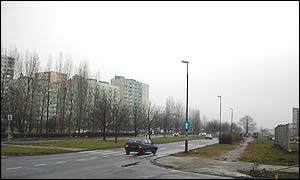| You are in: Business | ||||||||||||||||||||||||||||||||||||||||||||||||||||||||||||||||||||||||||||||||||||||||||||||||||||||||||||||||||||||||||||||||||||||||||||||||||||||||||||||||||||||||||||||||||||||||||||||||||||||||
|
Monday, 2 December, 2002, 08:15 GMT
Poland's rustbelt reborn

It's much nicer when the sun is shining, really
Endless strings of cars swish along the town's boulevards, and rainwater dyes the concrete a particularly depressing shade of sludge-grey. "Beware" reads the graffiti on the side of one of the grimmer housing blocks. To the uninitiated visitor, Nowa Huta seems to epitomise all that is worst about Eastern Europe - dismal, dehumanised and destitute.
Indeed, Nowa Huta occupies a unique place in the glum roll-call of communism.
Nowa Huta, which at its peak housed 200,000 people, was designed around a mammoth steel works, now known as Huta Sendzimira. Its arrow-straight boulevards fan out uniformly from a central square, in what its designers explicitly planned as a socialist realisation of the ideals of renaissance architecture. Metal fatigue But Nowa Huta's socialist dream turned sour long before the collapse of communism.
Far from being fired by Marxist zeal, the town's workers proved a persistent source of dissidence, and the steel works were paralysed by strikes during the declining years of communism. Since then, while other Polish steel plants have been privatised, Huta Sendzimira remains in state hands, capitalised by soft loans, but unable to keep up more than a small fraction of its communist-era output. In the meantime, the majority of steel workers in this one-company town have been laid off, and hopes of a steel boom are fast receding. Green shoots But it is not all gloom. The collapse in output at Huta Sendzimira has had the unexpected benefit of dramatically cutting pollution. The town's central planners had the sense to plant plenty of trees, and provided plenty of open space for the communist elite to engage in wholesome sports; combined with extremely low rents, Nowa Huta is starting to be a magnet for young families, keen to flee the expensive crush of Krakow. "It may not be lovely," says Jadwiga, a mother shopping with her children at a Nowa Huta store. "But our flat is clean and large, there are decent schools for the children, and most importantly, we can afford it." From steelworks to supermarkets Even more importantly, there is work in Nowa Huta again.
The communist paradise of Nowa Huta now bristles with multinational firms, notably at the mammoth M1 shopping centre, home to one of Poland's biggest hypermarkets. "Nowa Huta has changed more in the past 10 years than it did during all the communist period," says Aleksander Maciejowski, a bookkeeper at a Nowa Huta retailer whose father worked at Huta Sendzimira. Out with the old Central Europe is full of echoes of Nowa Huta. Few towns have made the transition so blatantly, but the region is replacing symbols of the communist past with symbols of the capitalist present at a break-neck pace.
This brutal juxtaposition does not please everyone, and the inequalities it produces threaten to stir up genuine social tension. But as EU membership looms for 10 ex-communist countries, the pace of creative disruption will only accelerate. |
See also:
26 Sep 02 | Business
24 Sep 01 | Business
22 Jul 02 | Europe
08 Feb 02 | Business
27 Nov 02 | Country profiles
Internet links:
The BBC is not responsible for the content of external internet sites Top Business stories now:
Links to more Business stories are at the foot of the page.
|
||||||||||||||||||||||||||||||||||||||||||||||||||||||||||||||||||||||||||||||||||||||||||||||||||||||||||||||||||||||||||||||||||||||||||||||||||||||||||||||||||||||||||||||||||||||||||||||||||||||
|
Links to more Business stories |
 |
||
| ----------------------------------------------------------------------------------
To BBC Sport>> | To BBC Weather>> | To BBC World Service>> ---------------------------------------------------------------------------------- © MMIII | News Sources | Privacy |